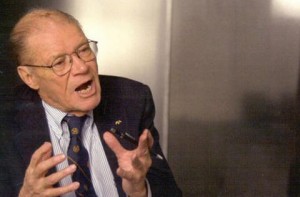The Fog Of War – MacNamara’s mist

truth missed in the fog of war
![]()
The Fog of War – Director Errol Morris
In Fog Of War ex-US Secretary of State Robert MacNamara, is given enough rope by Director Morris to almost hang himself. Once one of the most hated men in America for his central political role in the Vietnam War, MacNamara graces us with 11 ‘lessons’ or principles he has learned from his life. Some hubris: even God managed with ten. Most of McNamara’s are of stunning banality for which hindsight is for once no excuse. Indeed, the whole drift of McNamara’s often self-serving argument implies a twelfth overriding principle: “he who does not learn from history is condemned to repeat it.”
Don’t be put off. This is a disturbing, thought provoking, first class documentary fully deserving its Oscar. A pathology by a key player of one war, with striking resonance for current events. McNamara was the prequel to Rumsfeld. Before ‘Shock and Awe’ he gave us the equally catchy ‘Maximum Bang per Buck’ – sound-bite war marketing.. A dark echo from another time and another place, of efforts to improve the cost-effectiveness and efficiency of ways to kill
Like all good documentary makers, Morris lets his subject speak for itself. Superb editing, photography and an original, evocative musical score by Philip Glass, create a visual framework with pace and resonance, that makes what is essentially a talking head set up, always visually absorbing and satisfying. Extraordinary, recently released White House tapes of the time capture Kennedy and Johnson, struggling through the intimidating process of making major political decisions literally affecting the fate of millions. Head-hunted by Kennedy to be Secretary of State simply for his intellect, it is no surprise to discover that McNamara and LBJ were not a political marriage made in heaven. There is something eerily moving about these tapes which leads even McNamara into a little ‘what might have been’ speculation.
It is curious that an obviously very intelligent man should have derived such trite and clichéd lessons from his unique experience. Know your enemy, never say never, get the data, be prepared to re-examine your thinking – hardly set the philosophical heart racing. However the moral antennae perk up when the man who remembers that the use of ‘Agent Orange’ in Vietnam was initiated while he was in charge, but can’t remember whether he sanctioned it, tells us his life lesson that “sometimes to do good you have to do some evil.” Now I feel an argument coming on.
What this film quietly shows however is that we miss the deeper issues when we demonise people like McNamara. There is a very real sense of talented but normal human beings occupying almost mystically revered roles engendering impossible expectations, yet being helplessly caught in the mechanism of national and international political conflict. The whole of international affairs appear to be ruled by the law of unintended consequences. McNamara’s take on this is that we can never change human nature. Hard nosed realism undoubtedly but one can’t help feeling that a JFK would retort: “perhaps, but that doesn’t mean we shouldn’t try.”
Catch up with this on DVD if you like something to get your teeth into.
Zettel (2004)
McNamara’s Decalogue.
1. Empathise with your enemy
2. Rationality will not save us
3. Proportionality is a key principle of war.
4. Get the data
5. Never say never
6. Belief and seeing are often both wrong
7. Be prepared to re-examine your thinking
8. Can’t change human nature.
9. Never apply power unilaterally.
10. In order to do good you may have to engage in evil
Filed under: 4 stars, Documentary, Errol Morris, General, Philosophical, Uncategorized

